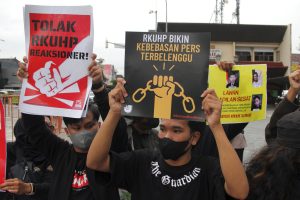The United Nations has expressed its concern about the threats to basic freedoms posed by Indonesia’s new criminal code, joining its voice to the thousands who have come out to protest the legislative overhaul over the past week.
Indonesia’s parliament approved the new penal code last week, with senior officials describing it as a move to jettison the country’s colonial-era penal code, which was bequeathed by the Dutch before independence in 1945.
In a statement late last week, the U.N.’s Indonesia office stated that “certain provisions” of the new code, which will come into effect after a transitional period of three years, “appear to be incompatible” with the various international conventions to which Indonesia is a signatory.
“The U.N. is concerned that several articles in the revised Criminal Code contravene Indonesia’s international legal obligations concerning human rights,” the U.N. said in the statement, which echoed the contents of a letter that U.N. human rights experts sent to the Indonesian government last month.
The new code is so broad and contains so many controversial or concerning provisions that it is hard to summarize succinctly. Among the changes that attracted the most international attention was the creation of new provisions penalizing cohabitation and sex before marriage, prompting false alarms that foreign tourists holidaying in Bali would be hauled off to prison for sharing hotel rooms. (In reality, the charges can only be brought by the close relatives of those involved, and their impacts are likely to fall most heavily on LGBTQ Indonesians.)
But human rights activists say that the impacts of the revised code are likely to be much broader: that it will have sweeping impacts on freedom of expression, privacy, the right to protest, and the unfettered workings of the press.
Amnesty International Indonesia, the local chapter of the London-based human rights group, has identified “at least 88 articles” that are broadly defined and “could be misused and misinterpreted by both authorities and the public to criminalize those who peacefully express their opinions or exercise their rights to peaceful assembly and association.”
Among these are bans on insults against the president and state institutions. The code also requires people to get a permit to hold protests and bans the spreading of fake news and any views that run counter to the state ideology of Pancasila.
There are also a host of ways that the code seeks to shift Indonesian society toward a conservative religious baseline. In addition to the ban on sex before marriage, these so-called “morality clauses” also include bans on the promotion of contraception to minors and its public promotion by those outside the medical profession, and a ban on abortion for non-rape victims. Activists say that the laws pose a particular risk to LGBTQ people, who are already threatened Indonesia’s rising tide of religious conservatism and exclusivism.
The breadth of the impacts are reflected in the U.N.’s statement, which states that the new code will likely “criminalize journalistic work and impinge upon press freedom”; “discriminate against, or have a discriminatory impact on, women, girls, boys, and sexual minorities”; “would risk adversely affecting a range of sexual and reproductive health rights, the right to privacy; and would likely “exacerbate gender-based violence, and violence based on sexual orientation and gender identity.”
It also claims that certain provisions “risk violating the rights to freedom of religion or belief, and could legitimize negative social attitudes towards members of minority religions or belief and lead to acts of violence against them.”
The U.N. statement was phrased in the characteristically cautious and neutral tones of international human rights legalese, but the very fact that the U.N. feels the need to weigh in speaks to the radical changes heralded by the passage of the new criminal code.
































